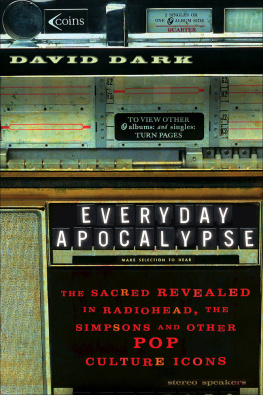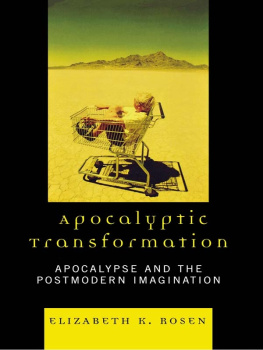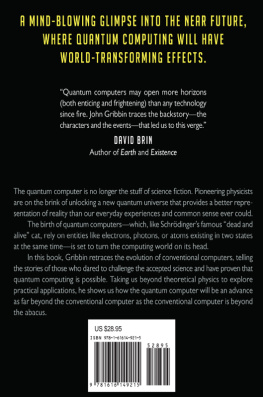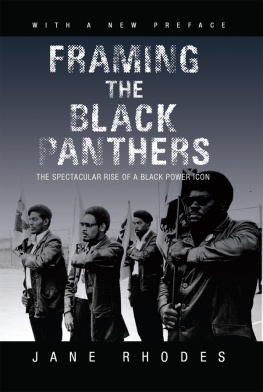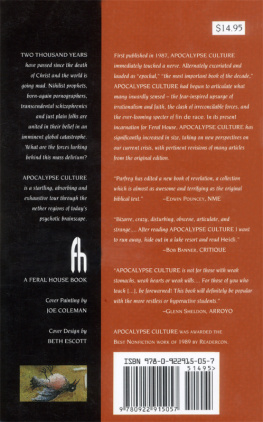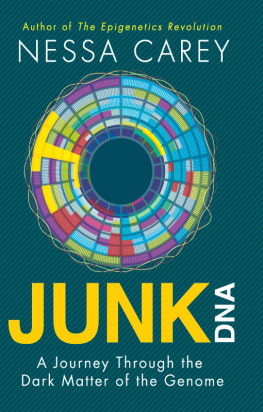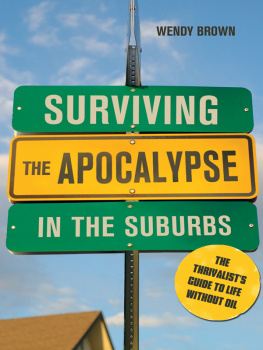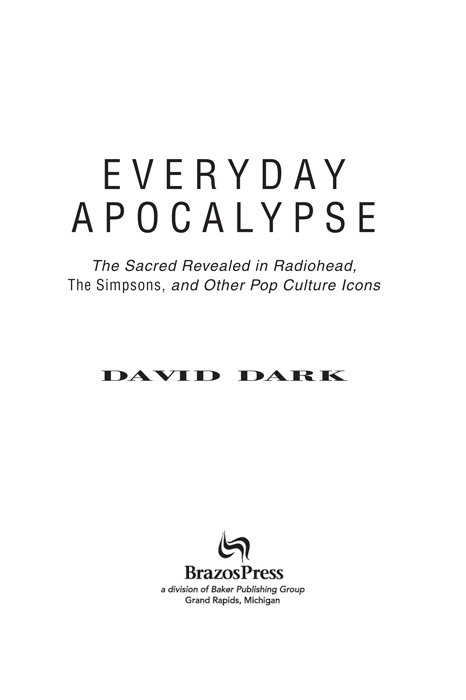
2002 by David Dark
Published by Brazos Press
a division of Baker Publishing Group
P.O. Box 6287, Grand Rapids, MI 49516-6287
www.brazospress.com
Ebook edition created 2012
eISBN 978-1-4412-3170-3
All rights reserved. No part of this publication may be reproduced, stored in a retrieval system, or transmitted in any form or by any meansfor example, electronic, photocopy, recordingwithout the prior written permission of the publisher. The only exception is brief quotations in printed reviews.
Scripture is taken from the New Revised Standard Version of the Bible, copyright 1989 by the Division of Christian Education of the National Council of the Churches of Christ in the USA. Used by permission.
Library of Congress Cataloging-in-Publication Data is on file at the Library of Congress, Washington, DC.
Dedication:
To Sarah
Who emanates apocalyptic
Contents
Acknowledgments
Crucial encouragement in the direction of the present work came early on through the generosity of Steve and Janice Stockman, Dwight Ozard, Charlie Peacock, Jay Swartzendruber, Douglas Kaine McKelvey, Nick Barre, Shelley Stephens, Melissa Palladino, John Wilson of Books and Culture , and Steve Taylor. Ive also been sustained by long-term votes of confidence from Michael and Cary Blythman, Dave and Ollie Adams, Ewan Gibson, Chris Fry, Jude Adam, Jenna Galbreth, Trevor Henderson, Mark McCleary, and Gareth Higgins. Anything clever or illuminating in my writing probably originates from fellowship and conversational tangents sponsored by the likes of Todd and Rusti Greene (Psalm 139 and instant nostalgia), Lee and Judith Smithey, Melinda Franklin, Liz Toohey, Geoff Little, Lon Bouldin, Randall Lancaster, Tom Wills, Andy Harding, Julie Lee, Gar and Autumn Saegar, and Wade Jaynes. Thanks are also due to Dave and Sue Perkins, Michael and Marilyn Wilson, Rob and Alexia Bancroft, Bill and Brenda Mallonnee, and James Stewart. For ongoing support in the classroom, Im deeply indebted to Mitch and Kara Menning, Phil Boeing, Joy MacKenzie, and Terri Eaves. And for patience and a willingness to at least maintain the appearance of interest, Id like to thank my families: the Darks, Masens, Sharps, Lovetts, Foremans, and Wileys. Personal invigoration has been derived from the artistic determination of the Anthropic Collective, the solidarity of the Ekklesia Project, the indispensable work of Christian Aid, and the intelligently designed music of Michael Sandison and Marcus Eoin of Boards of Canada. Finally, my gratitude goes out to Rodney Clapp and Rebecca Cooper, whose editing and fine-tuning have gone a long way in keeping me from embarrassing myself.
ONE
Flip the Script
Apocalyptic and the Lyricism of Protest
Arts necessary illusions serve to expose the illusory character of the experienced world.... Artists of necessity refer to the given world, yet to be art their work must imply (refer to) a whole new world of unrealized possibility.
James William McClendon
Witness: Systematic Theology , volume III
As a literary genre, apocalyptic is a way of investing space-time events with their theological significance; it is actually a way of affirming, not denying, the vital importance of the present continuing space-time order, by denying that evil has the last word in it.
N. T. Wright
The New Testament and the People of God
We apparently have the word apocalypse all wrong. In its root meaning, its not about destruction or fortune-telling; its about revealing. Its what James Joyce calls an epiphanythe moment you realize that all your so-called love for the young lady, all your professions, all your dreams, and all your efforts to get her to notice you were the exercise of an unkind and obsessive vanity. It wasnt about her at all. It was all about you. The real world, within which youve lived and moved and had your being, has unveiled itself. Its starting to come to you. You arent who you made yourself out to be. An apocalypse has just occurred, or a revelation, if you prefer.
Apocalyptic changes everything. Its intense attentiveness to the minute particulars, to the infinity forever passing before our eyes, can leave us feeling ashamed of our ongoing impenetrability to the immediate. It creates an unrest within our minds, and it can only be overcome by imagining differently, by giving in to its aesthetic authority, by letting it invigorate the lazy conscience.
Apocalyptic shows us what were not seeing. It cant be composed or spoken by the powers that be, because they are the sustainers of the way things are whose operation justifies itself by crowning itself as the way things ought to be and whose greatest virtue is in being realistic. Thinking through what we mean when we say realistic is where apocalyptic begins. If these powers are the boot that, to borrow Orwells phrase, presses down upon the human face forever, apocalyptic is the speech of that human face. Apocalyptic denies, in spite of all the appearances to the contrary, the forever part.
For both the very human wielder of the boot and the very human face beneath it, apocalyptic has a way of curing deafness and educating the mind. In our confusion, were accustomed to according the titles of good news and a positive message to the most soul-sucking, sentimental fare imaginable. Any song or story that deals with conflict by way of a strained euphemistic spin, a cliche, or a triumphal cupcake ending strikes us as the best in family entertainment. This is the opposite of apocalyptic. Apocalyptic maximizes the reality of human suffering and folly before daring a word of hope (lest too light winning make the prize light). The hope has nowhere else to happen but the valley of the shadow of death. Is it any surprise that we often wont know it when we see it?
Goodbye Cruel World
Our ability to recognize apocalyptic is, in our day, often most hindered by the popular, best-selling misunderstandings of biblical witness. Confusing the death-dealing forces that enslave, exploit, and crucify (what our biblical translations sometimes render the world) for the created world itself, such so-called apocalyptic is a negation of this-worldly experience. It tends to view the physical as only fit for burning. In a kind of Gnostic-style propaganda, creation is deemed a sort of waiting room, irredeemable and best discarded. Confusing redemption for escape, real injusticepolitical and personalgoes mostly unengaged, and the actual, everyday world gets left behind.
In this view, apocalyptic is simply equated with disaster or destruction, and the biblical summons to full-bodied, incarnate witness against dehumanization is exchanged for an almost nihilistic contempt for anything down-to-earth or, in the most meaningful sense, human. The big revelation of orthodox faith is renounced for a big removal that can smugly disregard the immediately physical as spiritually irrelevant. The big redemption (already in progress) of biblical witness is transmogrified into a big annihilation peculiarly well-suited to a mostly unincarnate faith that is often more than willing to help the earth along toward its impending destruction. Against the announcement of a new day to come on earth as it is in heaven, this heretical worldview can avoid the political implications of the new day coming by confining it to a spiritual issue, whatever that means.
But genuinely apocalyptic expression is a radical declaration concerning the meaning of human experience. Its job is to reflect, in a deeply liberating fashion, the tensions and paradoxes that constitute our understanding of reality. In lively contrast to any negation of creation, it actually accords our words, actions, and relationships an infinite importance by breaking down constructs of selfishness and self-delusion and challenging our concepts of power and profit. By announcing a new world of unrealized possibility, apocalyptic serves to invest the details of the everyday with cosmic significance while awakening its audience to the presence of marginalizing forces otherwise unnamed and unchallenged.
Next page
